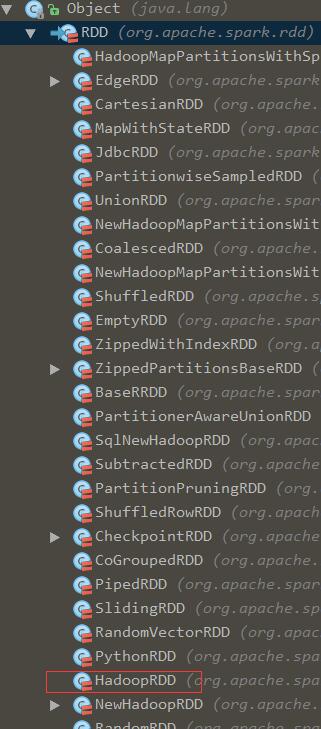从HDFS读取并转换为HadoopRDD
val path = args(0)
val dateTime = DateTime.now().getMillis
val jobName = "WordCount"
val sparkConf = new SparkConf().setAppName(jobName)
val sc = new SparkContext(sparkConf)
val data = sc.textFile(path, 2)
val paris = {
data.flatMap(l => l.replaceAll("\\.|,|\"", " ").trim.split(" ")).filter(w => !w.trim.equals("")).map(w => (w, 1))
}
val count = paris.reduceByKey((a, b) => a + b).sortByKey()
count.saveAsTextFile("output/" + jobName + "-" + dateTime)SparkContext类中包好了实例化HadoopRDD的方法:
/**
* Read a text file from HDFS, a local file system (available on all nodes), or any
* Hadoop-supported file system URI, and return it as an RDD of Strings.
*/
def textFile(
path: String,
minPartitions: Int = defaultMinPartitions): RDD[String] = withScope {
assertNotStopped()
hadoopFile(path, classOf[TextInputFormat], classOf[LongWritable], classOf[Text],
minPartitions).map(pair => **pair._2.toString**).setName(path)
}
// 注: pair => pair._2 取hadoopFile[K,V]中的V,即对应的文本内容,而K代表文本在文件中的偏移量?
def hadoopFile[K, V](
path: String,
inputFormatClass: Class[_ <: InputFormat[K, V]],
keyClass: Class[K],
valueClass: Class[V],
minPartitions: Int = defaultMinPartitions): RDD[(K, V)] = withScope {
assertNotStopped()
// A Hadoop configuration can be about 10 KB, which is pretty big, so broadcast it.
val confBroadcast = broadcast(new SerializableConfiguration(hadoopConfiguration))
val setInputPathsFunc = (jobConf: JobConf) => FileInputFormat.setInputPaths(jobConf, path)
new HadoopRDD(
this,
confBroadcast,
Some(setInputPathsFunc),
inputFormatClass,
keyClass,
valueClass,
minPartitions).setName(path)
}HadoopRDD继承了RDD:
class HadoopRDD[K, V](
sc: SparkContext,
broadcastedConf: Broadcast[SerializableConfiguration],
initLocalJobConfFuncOpt: Option[JobConf => Unit],
inputFormatClass: Class[_ <: InputFormat[K, V]],
keyClass: Class[K],
valueClass: Class[V],
minPartitions: Int)
extends RDD[(K, V)](sc, Nil) with LoggingRDD是一个抽象类,包含了对rdd的各种集合操作,通过带函数参数的函数,实现对rdd的特定转换,如:
/**
* Return a new RDD by applying a function to all elements of this RDD.
*/
def map[U: ClassTag](f: T => U): RDD[U] = withScope {
val cleanF = sc.clean(f)
new MapPartitionsRDD[U, T](this, (context, pid, iter) => iter.map(cleanF))
}
/**
* Return a new RDD by first applying a function to all elements of this
* RDD, and then flattening the results.
*/
def flatMap[U: ClassTag](f: T => TraversableOnce[U]): RDD[U] = withScope {
val cleanF = sc.clean(f)
new MapPartitionsRDD[U, T](this, (context, pid, iter) => iter.flatMap(cleanF))
}
/**
* Return a new RDD by applying a function to each partition of this RDD.
*
* `preservesPartitioning` indicates whether the input function preserves the partitioner, which
* should be `false` unless this is a pair RDD and the input function doesn't modify the keys.
*/
def mapPartitions[U: ClassTag](
f: Iterator[T] => Iterator[U],
preservesPartitioning: Boolean = false): RDD[U] = withScope {
val cleanedF = sc.clean(f)
new MapPartitionsRDD(
this,
(context: TaskContext, index: Int, iter: Iterator[T]) => cleanedF(iter),
preservesPartitioning)
}
def filter(f: T => Boolean): RDD[T] = withScope {
val cleanF = sc.clean(f)
new MapPartitionsRDD[T, T](
this,
(context, pid, iter) => iter.filter(cleanF),
preservesPartitioning = true)
}集成RDD的实现类在不同的场景下有不同的实现:

























 7155
7155

 被折叠的 条评论
为什么被折叠?
被折叠的 条评论
为什么被折叠?








